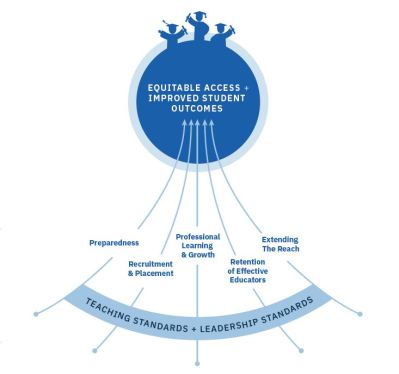Educator Effectiveness Framework
To ensure equitable access to effective educators, LEAs must create coherent systems of development and support that place instructional practices tied to student learning at their center. The Educator Effectiveness Framework identifies the components of a district system that are reflective of broad root causes that can serve as barriers to equitable access.
The Teaching Standards and Leadership Standards serve as the bedrock of the Framework, as they are both grounded in educational and developmental research and provide common, student-centric foundations for improving teaching. Every part of the Framework should align to these Standards.
This system can then be used to improve the preparation of new educators; identify effective educators as models and peer mentors; develop differentiated supports for all educators; create opportunities for self-reflection and collaboration; inform high-quality professional learning opportunities; and make strategic staffing decisions.
In doing so, we will better be able to ensure that all students in New York State have a great teacher and a great school leader, which will help us to achieve our shared goal of ensuring that each student is prepared for success in college, career, and citizenship.
- Formal LEA-IHE partnerships or collaborations
- Pre-service and in-service educator programs
- Pathways to service and licensure
- Activities to attract the most effective educators to LEAs and the schools that need them.
- Strategic placement of new and early career educators with seasoned mentors
- Induction and onboarding programs
Professional Learning and Growth
- Differentiated and ongoing support and mentoring for educators to advance their professional practice and improve their ability to produce positive student outcomes in tandem with a thoughtfully implemented evaluation system.
Retention of Effective Educators
- Use of evaluation system in smart retention of effective educators
- Opportunities for both vertical and lateral growth within the profession
- Performance-based compensation systems
- Incentives for effective educators to transfer to or stay in high-needs schools or hard-to-staff areas
- Collaborative teaching models
- Use of technology to increase the number of students directly taught by top teachers
- Using effective educators as providers of professional development for their colleagues






